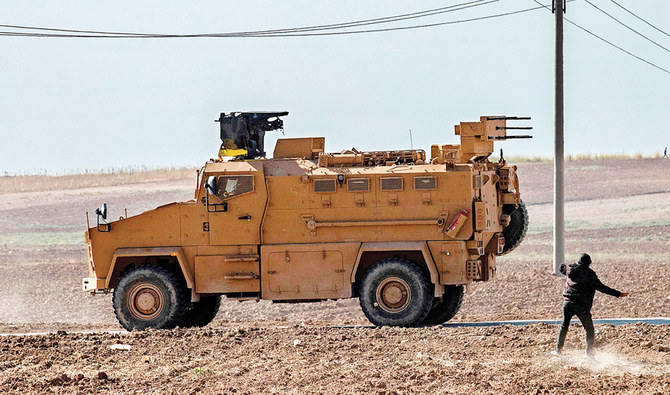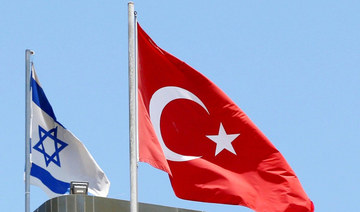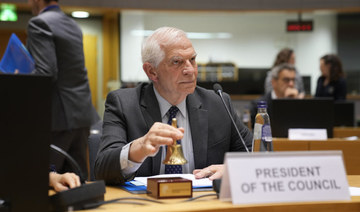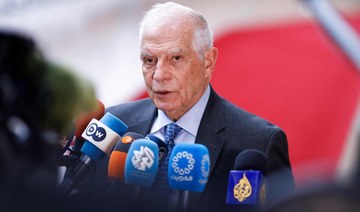ANKARA: With Turkey beginning the deportation process of Daesh captives held in its prisons back to Europe on Monday, the issue is brought back to the bilateral agenda between Ankara and EU, whose relations have been strained since the recent military incursion in northern Syria. The policy of deportation is likely to result in a new diplomatic fault line with Ankara’s allies in Europe.
On Tuesday, Turkish President Recep Tayyip Erdogan weaponized Daesh and the refugee issue again over the draft plans in Brussels to sanction Turkey over its drilling activities in the Mediterranean.
Erdogan implicitly threatened to release all Daesh prisoners it holds and send them back to Europe.
“Beware EU, we have 4 million refugees, we have Daesh terrorists in custody in Turkey and Syria. We can even stop the accession negotiations suddenly. EU should be careful,” he warned, adding: “Some countries have started panicking after we began the repatriation process of foreign Daesh terrorists. Turkey has been worrying about this issue for years, let others worry now.”
The EU’s sanction package intends “to sanction individuals or entities responsible for, or involved in, unauthorized drilling activities of hydrocarbons.”
The deportation wave from Turkey began with three Daesh prisoners, a German, a Dane and an American. The 28-year-old Dane citizen had been arrested on his arrival in Copenhagen, while the German ex-fighter had been also expelled. The American member has been stuck in no-man’s land between Turkish and Greek borders since Monday as Greek authorities refused him entry.
Dozens of others who fought in the militant group are also expected to be deported in the coming days. Among them are French, German and Irish ex-fighters.
The fate of foreign fighters from Daesh has been a controversial issue since the defeat of the group in Syria and Iraq. UN Secretary-General Antonio Guterres on Tuesday called for further international cooperation to resolve the issues related to foreign fighters.
Turkey has some 2,500 militants in its prisons. According to international standards, Ankara should repatriate Daesh members who were seized in Turkish territories, while those who were captured in Syria in territories beyond Assad control pose judicial problems.
However, Ankara put the blame on European countries of being too slow to reclaim their citizens who had joined Daesh.
FASTFACTS
• According to international standards, Ankara should repatriate Daesh members who were seized in Turkish territories, while those who were captured in Syria in territories beyond Assad control pose judicial problems.
• The deportation process marks another rupture in Brussels-Ankara relations.
Although some European countries like Germany, Denmark and the UK have stripped citizenship from their nationals who joined Daesh to prevent their return, Ankara is determined to send even those Daesh suspects who have had their citizenships revoked.
Turkish Interior Minister Suleyman Soylu recently said that “Turkey was not a hotel for foreign jihadis” even if they are legally stateless.
Ankara and Paris have strict bilateral protocols for deportation procedures, which allows the French authorities to repatriate terrorists.
However, Nihat Ali Ozcan, a retired major now serving as a security analyst at Ankara-based think tank TEPAV, said: “It is usually challenging to prove in a trial that Daesh members committed any crimes because convictions do not usually have supporting evidence.”
The average sentence for fighters returning to European countries has been about five years of imprisonment, which generates serious domestic security threats if the returned European nationals cannot go through an efficient rehabilitation process.
The irony of Turkey’s partial invasion of northeastern Syria is that Ankara now finds itself in the same situation as the very Syrian Kurdish YPG militia that it has been fighting.
Paul T. Levin, Director of the Stockholm University Institute for Turkish Studies
In recent weeks, Turkey arrested many people close to the former Daesh leader Abu Bakr Al-Baghdadi, who recently died during a US raid.
Erdogan is expected to discuss the fate of Daesh fighters during his meeting with his US counterpart Donald Trump in Washington on Wednesday.
The deportation process marks another rupture in Brussels-Ankara relations as last month some European countries launched an arms sales embargo to Turkey over its military incursion into northern Syria.
“The irony of Turkey’s partial invasion of northeastern Syria is that Turkey now finds itself in the same situation as the very Syrian Kurdish YPG militia that it has been fighting. Now both are stuck with a number of Daesh fighters and their families in custody, calling for Europe and countries elsewhere to take their citizens back,” Paul T. Levin, director of the Stockholm University Institute for Turkish Studies, told Arab News.
Levin said Turkey has an understandable concern over the refusal of European states to take responsibility for “their” Daesh fighters.
“Since these countries have not been willing to do much to help either Turkey or, more acutely, the YPG, there is a legitimate need to press the issue. And Turkey has some support in international law to demand that sender states take their citizens back,” he said.
Levin added that it is also especially problematic that the threat to send Daesh fighters to Europe comes as a response to EU sanctions against Turkey on an entirely separate issue.
“It suggests that he may be less interested in a joint solution to the problem of captured Daesh fighters than in being able to use them as leverage in foreign policy disputes,” he said.



























